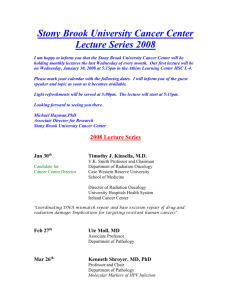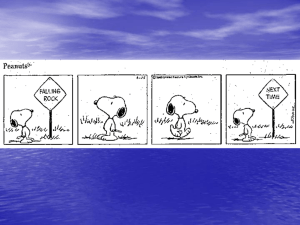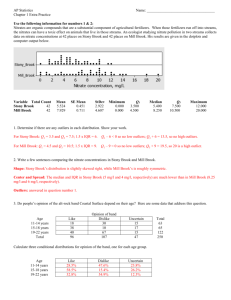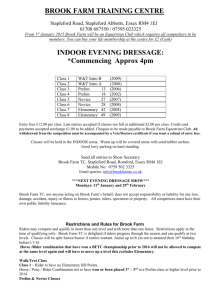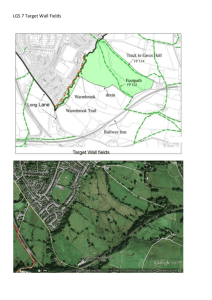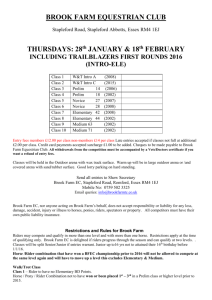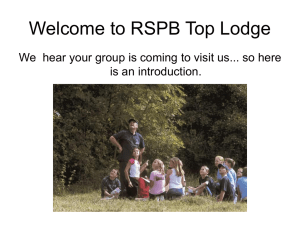Selected Frost Poetry Booklet
advertisement
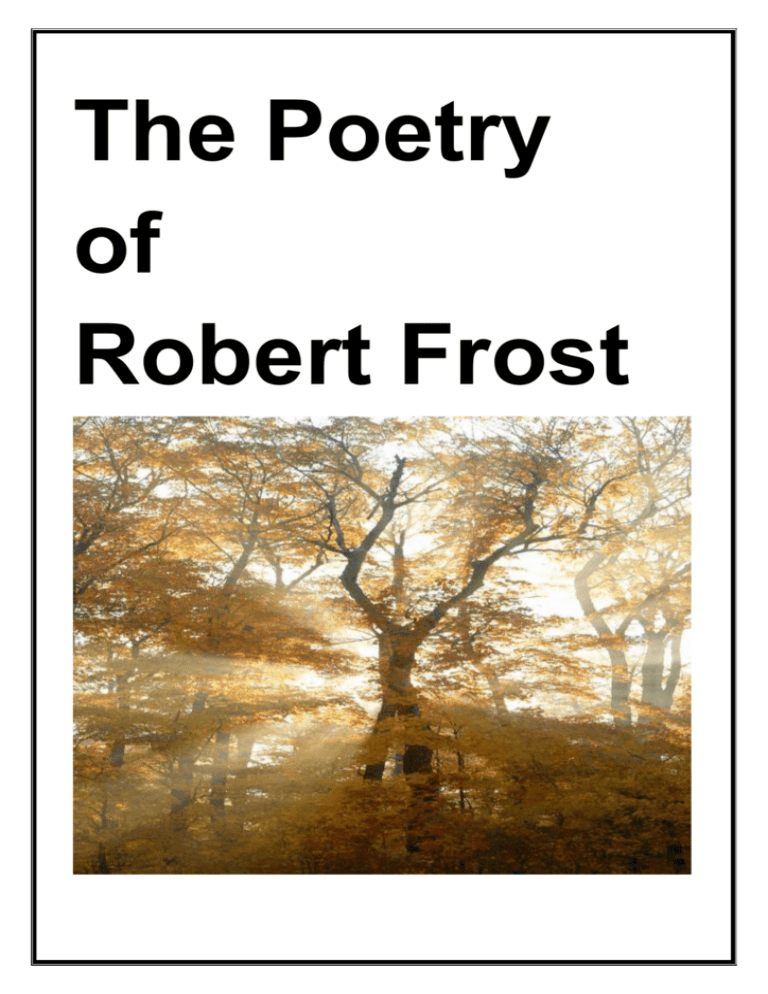
The Poetry of Robert Frost Index A Boy’s Will: 1913 Into My Own………………………………………………………………………….1 Stars…………………………………………………………………………………...2 Mowing………………………………………………………………………………..3 The Tuft of Flowers…………………………………………………………………...4 North of Boston: 1914 Mending Wall…………………………………………………………………………6 After Apple Picking…………………………………………………………………...7 Mountain Interval: 1916 The Road Not Taken………………………………………………………………….8 The Exposed Nest……………………………………………………………………..9 Birches……………………………………………………………………………….10 The Bonfire…………………………………………………………………………..12 New Hampshire: 1923 Fire and Ice…………………………………………………………………………..15 Nothing Gold Can Stay………………………………………………………………15 Stopping By Woods on a Snowy Evening…………………………………………...16 The Need of Being Versed in Country Things………………………………………17 The Freedom of The Moon…………………………………………………………..18 West Running Brook: 1928 West Running Brook………………………………………………………………...19 On Looking Up By Chance At The Constellations………………………………….21 A Further Range: 1936 A Leaf Treader……………………………………………………………………….22 Design………………………………………………………………………………..23 Afterflakes…………………………………………………………………………...24 INTO MY OWN One of my wishes is that those dark trees, So old and firm they scarcely show the breeze, Were not, as 'twere, the merest mask of gloom, But stretched away unto the edge of doom. I should not be withheld but that some day into their vastness I should steal away, Fearless of ever finding open land, or highway where the slow wheel pours the sand. I do not see why I should e'er turn back, Or those should not set forth upon my track To overtake me, who should miss me here And long to know if still I held them dear. They would not find me changed from him they knew-Only more sure of all I though was true. STARS How countlessly they congregate O'er our tumultuous snow, Which flows in shapes as tall as trees When wintry winds do blow!-As if with keenness for our fate, Our faltering few steps on To white rest, and a place of rest Invisible at dawn,-And yet with neither love nor hate, Those starts like some snow-white Minerva's snow-white marble eyes Without the gift of sight. MOWING There was never a sound beside the wood but one, And that was my long scythe whispering to the ground. What was it it whispered? I know not well myself; Perhaps it was something about the heat of the sun, Something perhaps, about the lack of sound-And that was why it whispered and did not speak. It was not dream of the gift of idle hours, Or easy gold at the hand of fay or elf: Anything more than the truth would have seemed too weak To the earnest love that laid the swale in rows, Not without feeble-pointed spikes of flowers (Pale orchises), and scared a bright green snake. The fact is the sweetest dream that labor knows. My long scythe whispered and left the hay to make. THE TUFT OF FLOWERS I went to turn the grass once after one Who mowed it in the dew before the sun. The dew was gone that made his blade so keen Before I came to view the leveled scene. I looked for him behind an isle of trees; I listened for his whetstone on the breeze. But he had gone his way, the grass all mown, And I must be, as he had been--alone, "As all must be," I said within my heart, "Whether they work together or apart." But as I said it, swift there passed me by On noiseless wing a bewildered butterfly, Seeking with memories grown dim o'er night Some resting flower of yesterday's delight. And once I marked his flight go round and round, As where some flower lay withering on the ground. And then he flew as far as eye could see, And then on tremulous wing came back to me. I thought of questions that have no reply, And would have turned to toss the grass to dry; But he turned first, and led my eye to look At a tall tuft of flowers beside a brook, A leaping tongue of bloom the scythe had spared Beside a reedy brook the scythe had bared. The mower in the dew had loved them thus, By leaving them to flourish, not for us, Nor yet to draw one though of ours to him, But from sheer morning gladness at the brim. The butterfly and I had lit upon, Nevertheless, a message from the dawn, That made me hear the wakening birds around, And hear his long scythe whispering to the ground, And feel a spirit kindred to my own; So that henceforth I worked no more alone; But glad with him, I worked as with his aid, And weary, sought at noon with him the shade; And dreaming, as it were, held brotherly speech With one whose thought I had not hoped to reach. "Men work together," I told him from the heart, "Whether they work together or apart." Mending Wall Something there is that doesn't love a wall, That sends the frozen-ground-swell under it And spills the upper boulder in the sun, And make gaps even two can pass abreast. The work of hunters is another thing: I have come after them and made repair Where they have left not one stone on a stone, But they would have the rabbit out of hiding, To please the yelping dogs. The gaps I mean, No one has seen them made or heard them made, But at spring mending-time we find them there, I let my neighbor know beyond the hill; And on a day we meet to walk the line And set the wall between us once again. We keep the wall between us as we go. To each the boulders that have fallen to each. And some are loaves and some so nearly balls We have to use a spell to make them balance: "Stay where you are until our backs are turned!" We wear our fingers rough with handling them. Oh, just another kind of outdoor game, One on a side. It comes to little more: There where it is we do not need the wall: He is all pine and I am apple orchard. My apple trees will never get across And eat the cones under his pines, I tell him. He only says, "Good fences make good neighbors." Spring is the mischief in me, and I wonder If I could put a notion in his head: "Why do they make good neighbors? Isn't it Where there are cows? But here there are no cows. Before I built a wall I'd ask to know What I was walling in or walling out, And to whom I was like to give offense. Something there is that doesn't love a wall, That wants it down." I could say "Elves" to him, But it's not elves exactly, and I'd rather He said it for himself. I see him there, Bringing a stone grasped firmly by the top In each hand, like an old-stone savage armed. He moves in darkness as it seems to me, Not of woods only and the shade of trees. He will not go behind his father's saying, And he likes having thought of it so well He says again, "Good fences make good neighbors." AFTER APPLE-PICKING My long two-pointed ladder's sticking through a tree Toward heaven still, And there's a barrel that I didn't fill Beside it, and there may be two or three Apples I didn't pick upon some bough. But I am done with apple-picking now. Essence of winter sleep is on the night, The scent of apples: I am drowsing off. I cannot rub the strangeness from my sight I got from looking through a pane of glass I skimmed this morning from the drinking trough And held against the world of hoary grass. It melted, and I let it fall and break. But I was well Upon my way to sleep before it fell, And I could tell What form my dreaming was about to take. Magnified apples appear and disappear, Stem end and blossom end, And every fleck of russet showing dear. My instep arch not only keeps the ache, It keeps the pressure of a ladder-round. I feel the ladder sway as the boughs bend. And I keep hearing from the cellar bin The rumbling sound Of load on load of apples coming in. For I have had too much Of apple-picking: I am overtired Of the great harvest I myself desired. There were ten thousand thousand fruit to touch, Cherish in hand, lift down, and not let fall. For all That struck the earth, No matter if not bruised or spiked with stubble, Went surely to the cider-apple heap As of no worth. One can see what will trouble This sleep of mine, whatever sleep it is. Were he not gone, The woodchuck could say whether it's like his Long sleep, as I describe its coming on, Or just some human sleep. THE ROAD NOT TAKEN Two roads diverged in a yellow wood, And sorry I could not travel both And be one traveler, long I stood And looked down one as far as I could To where it bent in the undergrowth; Then took the other, as just as fair, And having perhaps the better claim, Because it was grassy and wanted wear; Though as for that the passing there Had worn them really about the same, And both that morning equally lay In leaves no step had trodden black. Oh, I kept the first for another day! Yet knowing how way leads on to way, I doubted if I should ever come back. I shall be telling this with a sigh Somewhere ages and ages hence: Two roads diverged in a wood, and II took the one less travelled by, And that has made all the difference. THE EXPOSED NEST YOU were forever finding some new play. So when I saw you down on hands and knees In the meadow, busy with the new-cut hay, Trying, I thought, to set it up on end, I went to show you how to make it stay, If that was your idea, against the breeze, And, if you asked me, even help pretend To make it root again and grow afresh. But ’twas no make-believe with you to-day, Nor was the grass itself your real concern, Though I found your hand full of wilted fern, Steel-bright June-grass, and blackening heads of clover. ’Twas a nest full of young birds on the ground The cutter-bar had just gone champing over (Miraculously without tasting flesh) And left defenseless to the heat and light. You wanted to restore them to their right Of something interposed between their sight And too much world at once—could means be found. The way the nest-full every time we stirred Stood up to us as to a mother-bird Whose coming home has been too long deferred, Made me ask would the mother-bird return And care for them in such a change of scene And might our meddling make her more afraid. That was a thing we could not wait to learn. We saw the risk we took in doing good, But dared not spare to do the best we could Though harm should come of it; so built the screen You had begun, and gave them back their shade. All this to prove we cared. Why is there then No more to tell? We turned to other things. I haven’t any memory—have you?— Of ever coming to the place again To see if the birds lived the first night through, And so at last to learn to use their wings. BIRCHES When I see birches bend to left and right Across the lines of straighter darker trees, I like to think some boy's been swinging them. But swinging doesn't bend them down to stay. Ice-storms do that. Often you must have seen them Loaded with ice a sunny winter morning After a rain. They click upon themselves As the breeze rises, and turn many-coloured As the stir cracks and crazes their enamel. Soon the sun's warmth makes them shed crystal shells Shattering and avalanching on the snow-crust Such heaps of broken glass to sweep away You'd think the inner dome of heaven had fallen. They are dragged to the withered bracken by the load, And they seem not to break; though once they are bowed So low for long, they never right themselves: You may see their trunks arching in the woods Years afterwards, trailing their leaves on the ground, Like girls on hands and knees that throw their hair Before them over their heads to dry in the sun. But I was going to say when Truth broke in With all her matter-of-fact about the ice-storm, I should prefer to have some boy bend them As he went out and in to fetch the cows-Some boy too far from town to learn baseball, Whose only play was what he found himself, Summer or winter, and could play alone. One by one he subdued his father's trees By riding them down over and over again Until he took the stiffness out of them, And not one but hung limp, not one was left For him to conquer. He learned all there was To learn about not launching out too soon And so not carrying the tree away Clear to the ground. He always kept his poise To the top branches, climbing carefully With the same pains you use to fill a cup Up to the brim, and even above the brim. Then he flung outward, feet first, with a swish, Kicking his way down through the air to the ground. So was I once myself a swinger of birches. And so I dream of going back to be. It's when I'm weary of considerations, And life is too much like a pathless wood Where your face burns and tickles with the cobwebs Broken across it, and one eye is weeping From a twig's having lashed across it open. I'd like to get away from earth awhile And then come back to it and begin over. May no fate wilfully misunderstand me And half grant what I wish and snatch me away Not to return. Earth's the right place for love: I don't know where it's likely to go better. I'd like to go by climbing a birch tree~ And climb black branches up a snow-white trunk Toward heaven, till the tree could bear no more, But dipped its top and set me down again. That would be good both going and coming back. One could do worse than be a swinger of birches. THE BONFIRE “OH, let’s go up the hill and scare ourselves, As reckless as the best of them to-night, By setting fire to all the brush we piled With pitchy hands to wait for rain or snow. Oh, let’s not wait for rain to make it safe. The pile is ours: we dragged it bough on bough Down dark converging paths between the pines. Let’s not care what we do with it to-night. Divide it? No! But burn it as one pile The way we piled it. And let’s be the talk Of people brought to windows by a light Thrown from somewhere against their wall-paper. Rouse them all, both the free and not so free With saying what they’d like to do to us For what they’d better wait till we have done. Let’s all but bring to life this old volcano, If that is what the mountain ever was— And scare ourselves. Let wild fire loose we will….” “And scare you too?” the children said together. “Why wouldn’t it scare me to have a fire Begin in smudge with ropy smoke and know That still, if I repent, I may recall it, But in a moment not: a little spurt Of burning fatness, and then nothing but The fire itself can put it out, and that By burning out, and before it burns out It will have roared first and mixed sparks with stars, And sweeping round it with a flaming sword, Made the dim trees stand back in wider circle— Done so much and I know not how much more I mean it shall not do if I can bind it. Well if it doesn’t with its draft bring on A wind to blow in earnest from some quarter, As once it did with me upon an April. The breezes were so spent with winter blowing They seemed to fail the bluebirds under them Short of the perch their languid flight was toward; And my flame made a pinnacle to heaven As I walked once round it in possession. But the wind out of doors—you know the saying. There came a gust. You used to think the trees Made wind by fanning since you never knew It blow but that you saw the trees in motion. Something or someone watching made that gust. It put the flame tip-down and dabbed the grass Of over-winter with the least tip-touch Your tongue gives salt or sugar in your hand. The place it reached to blackened instantly. The black was all there was by day-light, That and the merest curl of cigarette smokeAnd a flame slender as the hepaticas, Blood-rot, and violets soon to be now. But the black spread like black death on the ground, And I think the sky darkened with a cloud Like winter and evening coming on together. There were enough things to be thought of then. Where the field stretches towards the north And the setting sun towards Hyla brook, I gave it To flames without twice thinking , where it verges Upon the road, to flames too, though in fear They might find old fuel there, in withered brake, Grass its full length, old silver golden-rod, An alder and grape vine entanglement, To leap the dusty deadline. For my own I took what front there was beside. I knelt And thrust hands in and held my face away. Fight such a fire by rubbing not by beating. A board is the best weapon it you have it. I had my coat. And oh, I knew, I knew, And said it out loud, I couldn’t bide the smother And heat so close in; but the thought of all The woods and town on fire by me, and all The town turned out to fight for me—that held me. I trusted the brook barrier, but feared The road would fail; and on that side the fire Died not without a noise of crackling wood— Of something more than tinder-grass and weed— That brought me to my feet to hold it back By leaning back myself, as if the reins Were round my neck and I was at the plough. I won! But I’m sure no one ever spread Another color over a tenth the space That I spread coal-black over in the time It took me. Neighbors coming home from town Couldn’t believe that so much black had come there While they had backs turned, that it hadn’t been there When they had passed an hour or so before Going the other way and they not seen it. They looked about for someone to have done it. But there was no one. I was somewhere wondering Where all my weariness had gone and why I walked so light on air in heavy shoes In spite of a scorched Fourth-of-July feeling. Why wouldn’t I be scared remembering that?” “If it scares you, what will it do to us?” “Scare you. But if you shrink from being scared, What would you say to war if it should come? That’s for reasons I should like to knowIf you can comfort me by any answer.” “Oh, but war’s not for children-it’s for men.” “Now we re digging almost down to China. My dears, my dears, you thought that- we all thought it. So your mistake was ours. Haven’t you heard, though, About the ships where war has found them out At sea, about the towns where war has come, Through opening clouds at night with droning speed Further o’erhead than all but stars and angels,And children in ships and in the towns? Haven’t you heard what we lived to learn? Nothing so new – something we had forgotten: War is for everyone, for children too. I wasn’t going to tell you and I mustn’t. The best way is to come up the hill with me And have our fire and laugh and be afraid.” FIRE AND ICE Some say the world will end in fire, Some say in ice. From what I've tasted of desire I hold with those who favour fire. But if it had to perish twice, I think I know enough of hate To say that for destruction ice Is also great And would suffice. NOTHING GOLD CAN STAY Nature's first green is gold, Her hardest hue to hold. Her early leaf's a flower; But only so an hour. Then leaf subsides to leaf. So Eden sank to grief, So dawn goes down to day. Nothing gold can stay. STOPPING BY WOODS ON A SNOWY EVENING Whose woods these are I think I know. His house is in the village, though; He will not see me stopping here To watch his woods fill up with snow. My little horse must think it queer To stop without a farmhouse near Between the woods and frozen lake The darkest evening of the year. He gives his harness bells a shake To ask if there is some mistake. The only other sounds the sweep Of easy wind and downy flake. The woods are lovely, dark, and deep, But I have promises to keep, And miles to go before I sleep, And miles to go before I sleep. THE NEED OF BEING VERSED IN COUNTRY THINGS The house had gone to bring again To the midnight sky a sunset glow. Now the chimney was all of the house that stood, Like a pistil after the petals go. The barn opposed across the way, That would have joined the house in flame Had it been the will of the wind, was left To bear forsaken the place's name. No more it opened with all one end For teams that came by the stony road To drum on the floor with scurrying hoofs And brush the mow with the summer load. The birds that came to it through the air At broken windows flew out and in, Their murmur more like the sigh we sigh From too much dwelling on what has been. Yet for them the lilac renewed its leaf, And the aged elm, though touched with fire; And the dry pump flung up an awkward arm; And the fence post carried a strand of wire. For them there was really nothing sad. But though they rejoiced in the nest they kept, One had to be versed in country things Not to believe the phoebes wept. THE FREEDOM OF THE MOON I've tried the new moon tilted in the air Above a hazy tree-and-farmhouse cluster As you might try a jewel in your hair. I've tried it fine with little breadth of luster, Alone, or in one ornament combining With one first-water start almost shining. I put it shining anywhere I please. By walking slowly on some evening later, I've pulled it from a crate of crooked trees, And brought it over glossy water, greater, And dropped it in, and seen the image wallow, The color run, all sorts of wonder follow. WEST RUNNING BROOK 'Fred, where is north?' 'North? North is there, my love. The brook runs west.' 'West-running Brook then call it.' (West-Running Brook men call it to this day.) 'What does it think k's doing running west When all the other country brooks flow east To reach the ocean? It must be the brook Can trust itself to go by contraries The way I can with you -- and you with me -Because we're -- we're -- I don't know what we are. What are we?' 'Young or new?' 'We must be something. We've said we two. Let's change that to we three. As you and I are married to each other, We'll both be married to the brook. We'll build Our bridge across it, and the bridge shall be Our arm thrown over it asleep beside it. Look, look, it's waving to us with a wave To let us know it hears me.' ' 'Why, my dear, That wave's been standing off this jut of shore --' (The black stream, catching a sunken rock, Flung backward on itself in one white wave, And the white water rode the black forever, Not gaining but not losing, like a bird White feathers from the struggle of whose breast Flecked the dark stream and flecked the darker pool Below the point, and were at last driven wrinkled In a white scarf against the far shore alders.) 'That wave's been standing off this jut of shore Ever since rivers, I was going to say,' Were made in heaven. It wasn't waved to us.' 'It wasn't, yet it was. If not to you It was to me -- in an annunciation.' 'Oh, if you take it off to lady-land, As't were the country of the Amazons We men must see you to the confines of And leave you there, ourselves forbid to enter,It is your brook! I have no more to say.' 'Yes, you have, too. Go on. You thought of something.' 'Speaking of contraries, see how the brook In that white wave runs counter to itself. It is from that in water we were from Long, long before we were from any creature. Here we, in our impatience of the steps, Get back to the beginning of beginnings, The stream of everything that runs away. Some say existence like a Pirouot And Pirouette, forever in one place, Stands still and dances, but it runs away, It seriously, sadly, runs away To fill the abyss' void with emptiness. It flows beside us in this water brook, But it flows over us. It flows between us To separate us for a panic moment. It flows between us, over us, and with us. And it is time, strength, tone, light, life and loveAnd even substance lapsing unsubstantial; The universal cataract of death That spends to nothingness -- and unresisted, Save by some strange resistance in itself, Not just a swerving, but a throwing back, As if regret were in it and were sacred. It has this throwing backward on itself So that the fall of most of it is always Raising a little, sending up a little. Our life runs down in sending up the clock. The brook runs down in sending up our life. The sun runs down in sending up the brook. And there is something sending up the sun. It is this backward motion toward the source, Against the stream, that most we see ourselves in, The tribute of the current to the source. It is from this in nature we are from. It is most us.' 'To-day will be the day....You said so.' 'No, to-day will be the day You said the brook was called West-running Brook.' 'To-day will be the day of what we both said.' ON LOOKING UP BY CHANCE AT THE CONSTELLATIONS You'll wait a long, long time for anything much To happen in heaven beyond the floats of cloud And the Northern Lights that run like tingling nerves. The sun and moon get crossed, but they never touch, Nor strike out fire from each other nor crash out loud. The planets seem to interfere in their curves But nothing ever happens, no harm is done. We may as well go patiently on with our life, And look elsewhere than to stars and moon and sun For the shocks and changes we need to keep us sane. It is true the longest drouth will end in rain, The longest peace in China will end in strife. Still it wouldn't reward the watcher to stay awake In hopes of seeing the calm of heaven break On his particular time and personal sight. That calm seems certainly safe to last to-night. THE LEAF TREADER I have been treading on leaves all day until I am autumntired God knows all the color and form of leaves I have trodden on and mired. Perhaps I have put forth too much strength and been too fierce from fear. I have safely trodden underfoot the leaves of another year All summer long they were overhead, more lifted up than I. To come to their final place in earth they had to pass me by. All summer long I thought I heard them threatening under their breath. And when they came it seemed with a will to carry me with them to death. They spoke to the fugitive in my heart as if it were leaf to Leaf. They tapped my eyelids and touched my lips with an invitation to grief. But it was no reason I had to go because they had to go. Now up, my knee, to keep on top of another year of snow. DESIGN I found a dimpled spider, fat and white, On a white heal-all, holding up a moth Like a white piece of rigid satin cloth-Assorted characters of death and blight Mixed ready to begin the morning right, Like the ingredients of a witches' broth-A snow-drop spider, a flower like a froth, And dead wings carried like a paper kite. What had that flower to do with being white, The wayside blue and innocent heal-all? What brought the kindred spider to that height, Then steered the white moth thither in the night? What but design of darkness to appall?-If design govern in a thing so small. AFTERFLAKES In the thick of a teeming snowfall I saw my shadow on snow. I turned up and looked back up at the sky, Where we still look to ask the why Of everything below If I shed such a darkness, If the reason was in me, That shadow of mine should show in form Against the shapeless shadow of storm, How swarthy I must be. I turned and looked back upward. The whole sky was blue; And the thick flakes floating at a pause Were but frost knots on an airy gauze, With the sun shining through.
